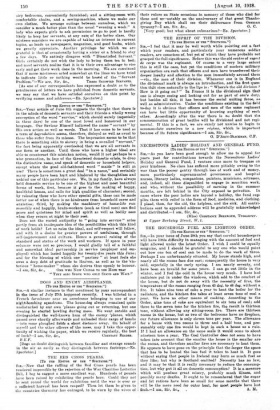THE HOUSEHOLD FUEL AND LIGHTING ORDER. [To THE EDITOR OF
TEE" SPECTATOR."]
Six,—In your issue of June 29th you say that careful housekeepers will have little difficulty in managing with the amount of fuel and light allowed under the latest Order. I wish I could be equally sanguine, and I should be grateful to any one who would point out how one ton of coal can be made to do the work of three. Perhaps I am unfortunately situated. My house stands high, and nearly all the rooms face due east; consequently the house is very cold, especially in the early spring. I am nearly seventy, and have been an invalid for some years. I can go out little in the winter, and I feel the cold in the house very much. I have had radiators put in under the windows, whioh add to the comfort of the house, but do not do away with the necessity of fires, the temperature of the rooms ranging from 43 deg. to 48 deg. without a, fire. It takes nine tons of coke a year to heat the boiler for 'the radiators, and the kitchen fire takes at least seven tons of coal a year. We have no other means of cooking. According to the Order, nine tons of coke are equivalent to six tons of coal; add these to the seven tons for the kitchen fire, the result is thirteen toss, without allowing any sitting-room fire. There are thirteen rooms in the house, but as two of the bedrooms have no fireplace, our future allowance ha only eleven tons per year. The allowance for a house with two rooms is three and a half tons, and pre- sruniably -only one fire would be kept in such a house as a rule. If I had an allowance -on the same scale it would come to about nineteen tons a year. The Coal Controller does not seem to have taken into account that the smaller the house is the smaller are the rooms, and therefore smaller fires are necessary to heat them. He appears to have gone on the principle that the larger the apace that has to be heated the lees fuel it takes to heat it. It goes without saying that people in Ireland may burn as much fuel as they like; but why Is Scotland omitted? Necessity has no law, and it may be that it is really necessary to reduce the consump- tion, but why put it all on domestic consumption? It is a measu.re which will produce great misery, probably much illruwe, and possibly many deaths. It ought to be remembered that the sugar and fat rations have been so small for some months that there will be the more need for outer heat, for most people have lost


































 Previous page
Previous page